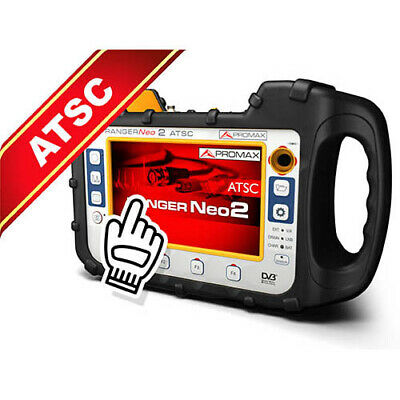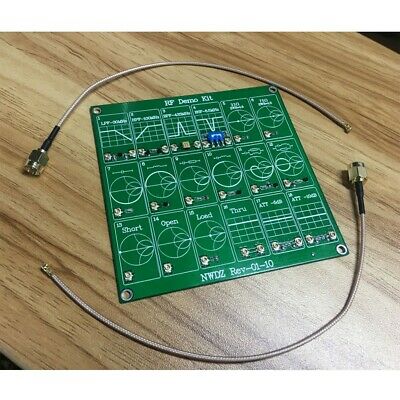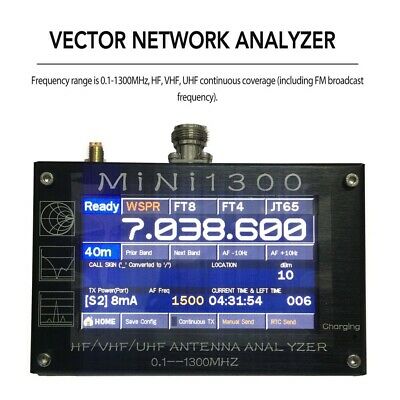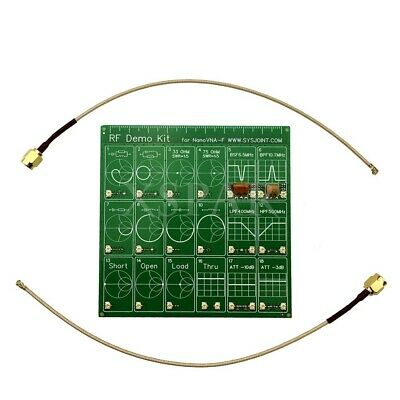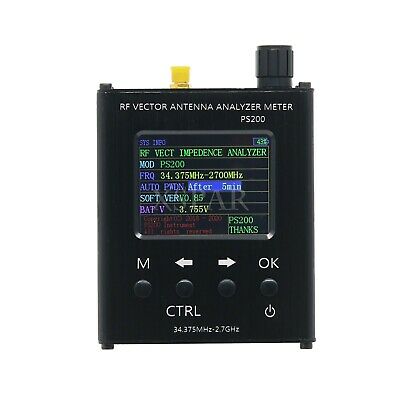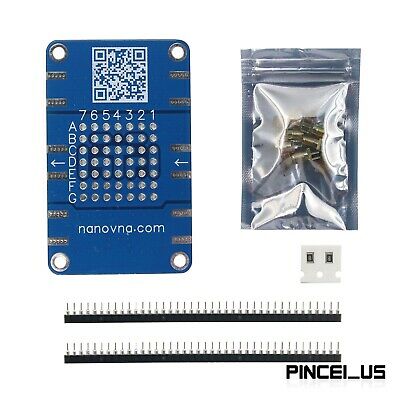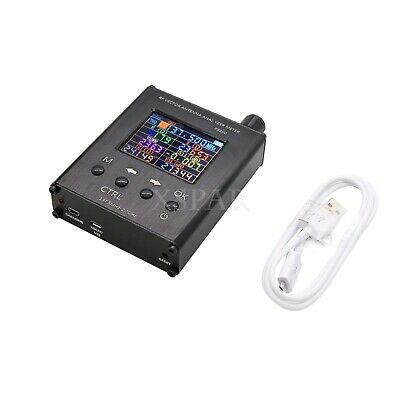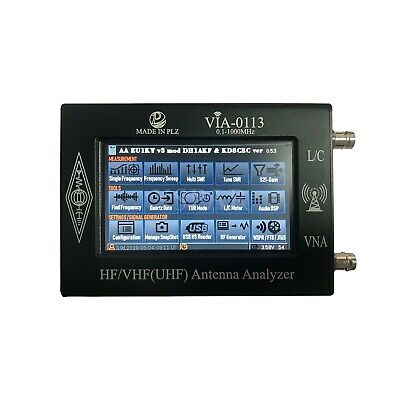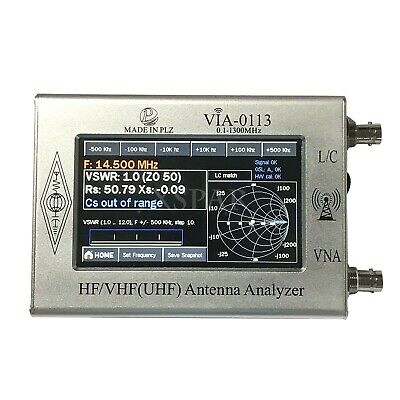-40%
PROMAX RANGERNeo 2 ATSC Prof Field Strength Meter/Spectrum Analyzer
$ 3500.64
- Description
- Size Guide
Description
Subscribe to Our NewsletterPROMAX RANGERNeo 2 ATSC Professional Field Strength Meter and Spectrum Analyzer with ATSC
Brand:
Promax
Model No:
RANGERNeo 2 ATSC
Our Model No:
RANGERNEO2ATSC
Product Overview
Features
Frequency range: 5 to 2,500 MHz
Input range: -90 dBm to +20 dBm (approx. 20 dBuV - 130 dBuV)
Resolution filters: 10 / 20 / 30 / 40 / 100 / 200 kHz, 1 MHz
Span range: Full span, 1500, 1265, 850, 500, 250, 200, 100, 50, 20, 10, 2, 1 MHz
Fast sweep time: 70 ms depending on span/RBW
Amplitude sensitivity: 1, 2, 5, 10 dB/DIV
Advanced features: Markers, Max/Min hold, Persistence, Trace averaging, RMS/PEAK, SAT IRG descriptor
LNA/LNB power: 5/13/15/18 VDC, 22 kHz, DiSEqC, SATCR, dCSS
Remote control: Ethernet port, webserver, SNMP
Display: 7 in. touch screen color TFT
Battery time: More than 4 hours
Digital Broadcast Standards
ATSC
DVB-T/T2, DVB-T2 lite
DVB-C/C2
DVB-S/S2
DVB-S2 Multistream
DSS, ACM / VCM / CCM
DAB, DAB+ (optional)
MPEG-TS
Functions
Constellation diagram
LTE ingress test
Dynamic echoes analysis
StealthID (instant identification of tuning parameters)
PLS (Physical Layer Scrambling)
Ultra fast spectrum analyzer (70 ms sweep time)
4K Frame grabber
MAX and MIN hold
FM RDS radio measurement and decoding
Screenshots and Datalogger for measurement reports
Beacon-Flyaways SND and VSAT
Wideband LNB
WiFi 2.4 GHz
LTE 1.8 GHz
OTT
Service Recording
Field strength measurement
Task planner
Merogram
Spectrogram
Signal monitoring
Remote control (webControl)
MER by carrier
GPS coverage analysis analyzer (optional)
Video/Audio streaming
SCAN + TILT
Shoulder attenuation
TS recording
TS analysis
IPTV multicast measurement and decoding
Advanced DAB/DAB+ analyzer (optional)
Applications
Teleport 24/7 monitoring
SNG, VSAT, Flyaway antenna alignment
SOTM Terminals (Satcom On-The-Move)
Government and military SATCOM
Oil rig and maritime satellite communications
Beacon, TT&C (Telemetry, Tracking, and Command) signal location and monitoring
Satellite, TV, CATV entertainment systems
VSAT system on-site and remote commissioning
OB van antenna alignment and signal monitoring
Description
The PROMAX RANGERNeo 2 ATSC Professional Field Strength Meter and Spectrum Analyzer with ATSC covers from 5 to 2500 MHz and includes HEVC decoding. The RANGERNeo 2 ATSC features the "4K frame grabber" tool which decodes UHD video frames and displays them in a slideshow mode.
Network Delay Margin
Network planners determine what time instant transmitters should use to broadcast the transport stream bits. They all have to do it at a precise given time, e.g. 700 ms in the picture. The difference between the network delay and the required transmission time (700 ms in the example) is called the "network delay margin" and it will be different depending on the specific transmitter location. The lower the 'network delay margin' the higher the chances of that particular transmitter missing the assigned transmission time.
Reference Traces
Freeze the spectrum graph and compare it with the running trace. Save that information and use it to identify satellites based on their spectrum footprint.
Triple Split Display
Up to 9 different ways to combine TV, measurement and spectrum modes.
Touch Screen
Place the marker on any channel and move the trace using your finger. Enter frequencies or file names using the soft keypad.
MIN and MAX Hold
Display them separately or simultaneously along with the current spectrum trace.
Simultaneous Real Spectrum Analyzer Information + WiFi Access Point Data
WiFi signals can be disturbed by interference from other WiFi stations, for example other access points, but also from non-WiFi signals such as wireless CCTV cameras or a microwave oven. RANGERNeo 2 ATSC can display real spectrum analyzer information and access point data simultaneously.
Access Point Information
RANGERNeo 2 ATSC shows convenient information from the access points such as SSID, RSSI, SNR, security information, etc. It also indicates the number of access points per channel and offers you guidance regarding the level of occupancy of a specific channel.
webControl
The RANGERNeo 2 ATSC internal webControl offers four main areas: Spectrum analyzer, TV Parameters, Remote console and Monitoring mode.
The Spectrum analyzer area shows us the spectrum trace, and all measurements for the RF channel being tuned, while we can modify reference level, span, channel/frequency and channel plan used.
The TV parameter area offers relevant metadata identifying the network (NID), (ONID), TS, Service, LCN, etc. along with the video slideshow of one of the services in the selected channel.
RANGERNeo 2 ATSC Console
Complete control over your field strength meter from anywhere in the world and with no additional software installation required. A virtual platform that gives you access to all of the analyzer features.
Video/Audio Streaming
It is now possible to stream the Transport Stream after channel demodulation either over a private LAN or over the Internet, as a unicast (UDP) stream. The service as seen on the analyzer screen can be streamed as a SPTS over IP, or as a full TS containing all services for the channel being tuned.
The same feature can be used for other streams received over IP or previously recorded, instead of coming from an RF source.
Merogram and Spectrogram
These functions have been developed to allow an early detection of intermittent impairments that may occur in very short periods of time and can not be monitored otherwise.
Attenuation Test
Test the frequency response of your installation using RP-050, RP-080, RP-110B signal generators.
16/32 APSK, 8PSK and QPSK Constellation
In the case of an ideal transmission channel, free of noise and interferences, all symbols are recognized by the demodulator without errors. In this case, they are represented in the constellation diagram as well defined points hitting in the same area and forming a clear dot.
Network Bitrate
The network bitrate gives you an indication of the network load and possibility of overload.
Multicast Media Delivery Index and FEC
A key quality measurement formed by the Delay Factor and the Media Loss Rate. FEC measurements are also available.
IP Ethernet Frame Viewer
IP Ethernet frame viewer captures a multicast packet displaying all its frame details, for example Time-To-Live (TTL), all fields of RTP protocol, etc. It is very helpful to study IPTV signalisation problems.
PING, Trace, Average Packet Delay and IPDV
PING, Trace, Average Packet Delay and IPDV are very useful to identify the reasons for communication problems, anything from complete service interruptions to uncontrolled delays which can be as important in terms of service performance.
Beacon-flyaways, SNG and VSAT
Satellite BEACON signals can be clearly seen thanks to the 1 MHz SPAN and 10 kHz resolution filters.
Having the proper resolution filters is critical in some applications, RANGERNeo 2 ATSC includes a very narrow 2 kHz filter available in terrestrial TV band.
VCM/ACM Modulation Schemes
VCM/ACM (Variable/Adaptative Coding and Modulation) allow changing the modulation parameters used in the same RF channel over time.
IRG Descriptor Identification
The IRG descriptor is an embedded code that is added to video links containing contact info, GPS coordinates, etc from the source signal to allow a quick troubleshoot of interferences in scenarios such as live transmissions of sports events.
dCSS LNBs
Digital Channel Stacking Switch LNB can support several users on a single cable distribution system by allocating specific user bands for each of them. It is not possible to work with this type of LNB unless your field strength meter communicates using EN50494 (SATCR, UNICABLE) and EN50607 (dCSS, JESS, UNICABLE II) standard protocols.
PLS - Physical Layer Scrambling
The PLS index is a number generated by the broadcaster that must be properly decoded by the customer so that demodulation is possible. RANGERNeo 2 ATSC can also work with this type of signals.
DVB-S2 Multistream
Advanced modulation techniques combine several independent transport streams into one single RF carrier. Selecting a specific TS is easy with your RANGERNeo 2 ATSC using the ISI Filtering function.
L-Band Spectrum Analyzer
RANGERNeo 2 ATSC is more than just a spectrum analyzer. It is truly multifunctional, including characteristics such as 10 kHz to 1 MHz resolution bandwidths, high frequency accuracy, screen capture functionality, datalogger and 24/7 signal monitoring, spectrogram, remote control via webserver and SNMP, all in one box.
Lightweight and Durable
Teleport operators, as well as anyone involved in transmission quality assessment can rely upon the RANGERNeo 2 ATSC to obtain the information they need to ensure proper system performance.
Weighing just 2.2 kg it is built to last in a sturdy double injection moulding weatherproof body.
24/7 Monitoring
The RANGERNeo 2 ATSC spectrum analyzer will help you identify signal impairments locally or remotely. It will offer you remote control, webserver, SNMP compatibility, video streaming capabilities or the possibility to set up alarms for automatic monitoring applications.
LTE Interference on SMATV Systems
The RANGERNeo 2 ATSC has a variery of tools to compare the signal reception quality measurements on digital TV channels with and without the LTE filter. This is very helpful to anticipate the performance improvement you should expect on your TV distribution system well before you physically make changes to the cabling to insert the LTE filter.
LTE Interference on CATV Networks
Some of the bands allocated to LTE are near or inside former television bands. For example band 20 (uplink 832-862 MHz; downlink 791-821 MHz). The RANGERNeo 2 ATSC has special functions to help installers determine the level of activity in those bands and therefore anticipate potential interference problems.
Downlink and Uplink Interference
Downlink interference comes from the mobile phone base stations which are placed at fixed locations and are always on. This is not the case of Uplink interference which comes from the handheld devices and therefore it can be a lot more difficult to locate and mitigate.
LTE Signals and Channel Repack
The use of Smartphones is widely spread all over the world. In order to meet user demand for bandwidth, mobile phone operators need to expand their networks, use more efficient transmission standards (LTE) and use part of the bandwidth historically assigned to TV broadcast services (channel repack in the US or digital dividend in Europe).
M2M Machine to Machine Applications
Besides LTE interference measurements there is also an increasing need to look at the LTE signals themselves. This function can also be useful for Machine to Machine applications (electric car charging station, vending machine, wireless credit card reader, etc.). One of the first problems you encounter is to make sure there is good signal coverage from the operator the system is working with.
DiSEqC Commands
Elementary DiSEqC commands are available from a drop-down list. They can be combined to form macros which can also be associated to a channel table.
Digital Services Database
RANGERNeo 2 ATSC builds a list of the TV and RADIO services detected as it tunes the different digital channels. Besides tuning by frequency and channel It is then possible to select a specific service from the list.
Table Analysis
This function shows every detail of the transport stream tables in real time on a tree diagram. This is an outstanding function which is normally only available in more expensive equipment. It is possible to navigate through the tree branches using the joystick or the touch screen functionality.
Record, Analyze, Decode and Copy a Transport Stream
A function available for RANGERNeo 2 ATSC that enables the instrument to record the received TS in real time onto a a USB pendrive or on its internal memory. The recorded TS can also be decoded or analyzed.
StealthID
The RANGERNeo 2 ATSC StealthID function automatically identifies the required demodulation settings while tuning so that you don't need any previous information about the signal.
Full Band Power
The measurement of full band power is very useful to understand how much energy is available in total at the test point.
Datalogger and Test&Go
The datalogger can perform channel power, carrier/noise, BER, MER (etc.) measurements automatically. It can also save information from the NIT table such as the network name or even the SID and names of the services in the mux under test. All this information is saved inside the meter and it can be downloaded to a USB memory or to a PC for further processing later on.
Task Planner
This function allows to set-up a task list, both for screen capture or Datalogger acquisition, selecting when to start, a repetition rate and the number of times the selected task must be performed. The equipment can be switched off after setting all parameters and will itself wake-up, at the required time, to perform the planned tasks.
Coverage Analysis and GPS
This option turns the RANGERNeo 2 ATSC into the perfect tool to perform signal coverage "drive test" analysis functions. It can capture different kind of measurements embedding time/date and geographic coordinates information.
Creating Reports
All this information is saved automatically to either the internal meter's memory or to an external USB memory and can be transferred to a PC computer using a universal XML format. Once on the PC the data can be processed and presented in different ways among which overlaying the values on a map is the most interesting.
Selective Optical-to-RF Converter
RFoG (Radiofrequency-over-Glass), as well as optical TV&SAT distribution, is used more and more by operators because it allows them to benefit from the advantages of fibre optics to compete with FTTH service providers. The RF signal at the converter output can be analyzed, measured and decoded by the meter as one would usually do with any signal over copper wires.
6 GHz RF Auxiliary Input
The RANGERNeo 2 ATSC optical fibre option comes along with 6 GHz RF auxiliary input which can be used among other applications for direct connection to wholeband LNB's with 5.45 GHz RF output. This auxiliary input covers three bands:
Band I from 2150 MHz to 3000 MHz Band II from 3400 MHz to 4400 MHz Band III from 4400 MHz to 6000 MHz
SCAN
CATV installers appreciate very much having a SCAN function on their analyzer for it allows them to check all the channel levels in a graphical way.
TILT
Using pilot generators as a reference, the TILT feature helps us to equalize the CATV network. We can detect as many as 4 pilots along the band from 6 - 999 MHz. The meter will calculate the level difference between the two most distant pilots and the tilt measurement (dB/MHz).
DAB+ Digital Radio (Optional)
DAB+ is an evolution of DAB (Digital Audio Broadcast) that among other differences uses AAC+ audio codec. It also includes Reed-Solomon error correction algorithm which makes it more robust against transmission impairments. RANGERNeo 2 ATSC DAB option is compatible with both standards.
ETI Recording
ETI stands for Ensemble Transport Interface and it may be described as the equivalent to the Transport Stream for DAB. It is possible to record ETI on the analyzer so that it can then be copied to an external device for further analysis.
DAB Constellation Diagram
DAB uses DQPSK modulation and so its constellation diagram shows a cloud of dots clustered around four points.
Dynamic Echoes Analysis
DAB can also be operated in a Single Frequency Network (SFN) and therefore the dynamic echoes analysis becomes a handy function to have.
Ethernet Connectivity
Ethernet and IP protocols are now the gold standards for remote control applications and RANGERNeo 2 ATSC offers this functionality. Besides remote control the IP interface can be used to save or retrieve data from a PC, copy channel tables or installation information, dataloggers, screenshots, etc.
More Internal Memory: Up to 6 GB
There is more data a RANGERNeo 2 ATSC can store in the internal memory, dataloggers, screen shots, signal monitoring files, etc. However, it is the transport stream recording what uses up memory faster. Even though the information can be downloaded to a PC or even copied to a pendrive in the field, the 6 GB of internal memory in the RANGERNeo 2 ATSC are far from negligible.
Field Strength Measurements
The RANGERNeo 2 ATSC can do FSM Field Strength Measurements. The antenna K factor can be entered manually or in the form of a file.
Transport Stream Input and Output
RANGERNeo 2 ATSC can monitor and analyze streams coming out from satellite receivers, transport stream players, multiplexers, etc. Received transport stream signals can also be output to other devices.
Common Interface
The RANGERNeo 2 ATSC includes a CI slot to interface with CAM modules available in the market and decode encrypted channels. The use of encryption is widely spread among television operators so this function is very useful.
HDMI Interface
The RANGERNeo 2 ATSC includes an HDMI output to interface with other High Definition equipment. It can also be very useful to check proper operation of the client's TV while on a service call. Everything that can be seen on the meter's screen is available through the HDMI.
Video Input
A RCA to jack adapter is also included for SD composite video input in all RANGERNeo 2 ATSC products.
USB and Ethernet Connections
The RANGERNeo 2 ATSC includes USB and Ethernet interfaces. The USB can be used to copy files to memory sticks for example. Remote control and web server functionality are available through the Ethernet port.
Included Components
1 - External DC Charger
1 - Mains Cord for External DC Charger
1 - Car Lighter Charger
1 - Dual WiFi Antenna
1 - USB WiFi Adapter
1 - Aero SMA-H/BNC-M Adapter
1 - "F"/f - BNC/f Adapter
1 - "F"/f - DIN/f Adapter
1 - "F"/f - "F"/f Adapter
1 - Support Belt and Carrying Bag
1 - 4V/RCA Jack Cable
1 - USB (A) - USB (A) Cable
1 - Monopod
1 - Transport Suitcase
1 - Quick Start Guide
Terms & Conditions
Please note estimated delivery time above. Contact us for details or if you have a delivery requirement. We ask for your patience while striving to ensure your shipment arrives quickly and accurately.
Domestic Shipping
FREE Standard Shipping on items OVER and less than 30lbs to continental U.S. Add for AK, HI, or PR. Please contact us for shipping rates to any overseas US territories including: Northern Mariana Islands, Guam, Puerto Rico, U.S. Virgin Islands and American Samoa.
PO Boxes/APOs require USPS shipping and may therefore experience longer lead times
6.25% Sales Tax for shipping to MA
International Shipping
Due to international voltage requirements, please ask us prior to purchasing to confirm your product will operate correctly in your country.
Please contact us for shipping rates to any overseas U.S. territories.
International customers are responsible for all shipping charges, including any duties or taxes.
